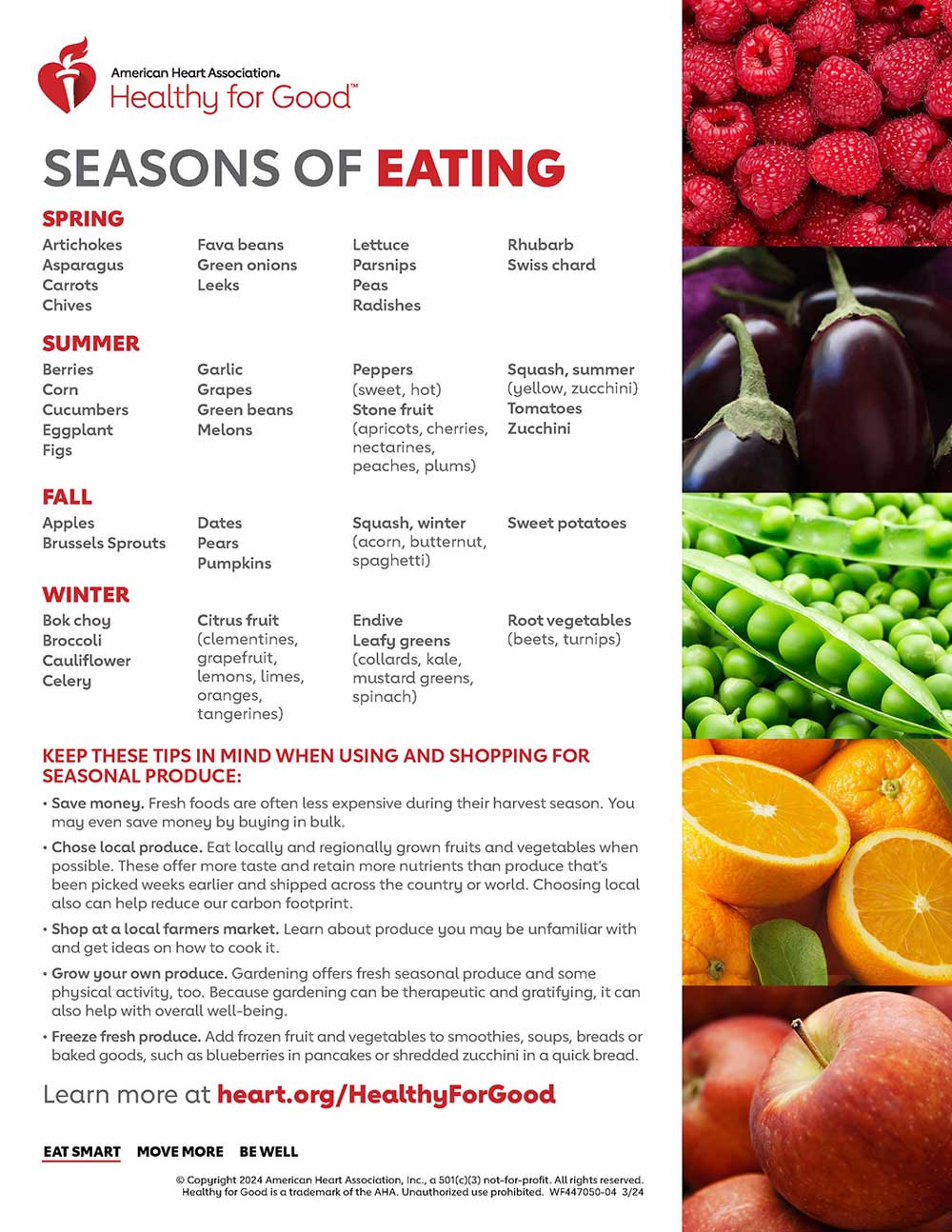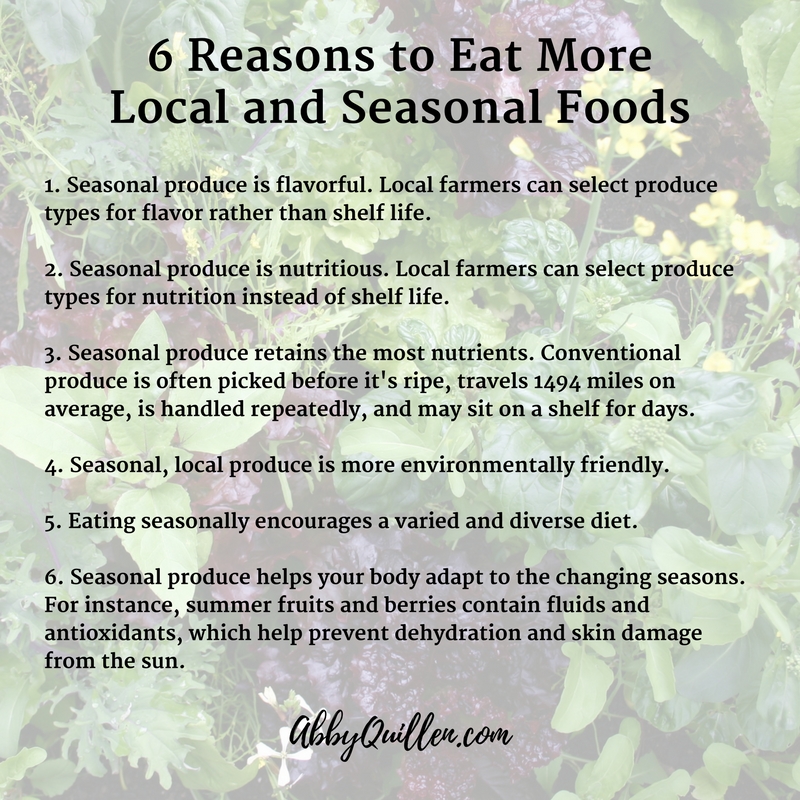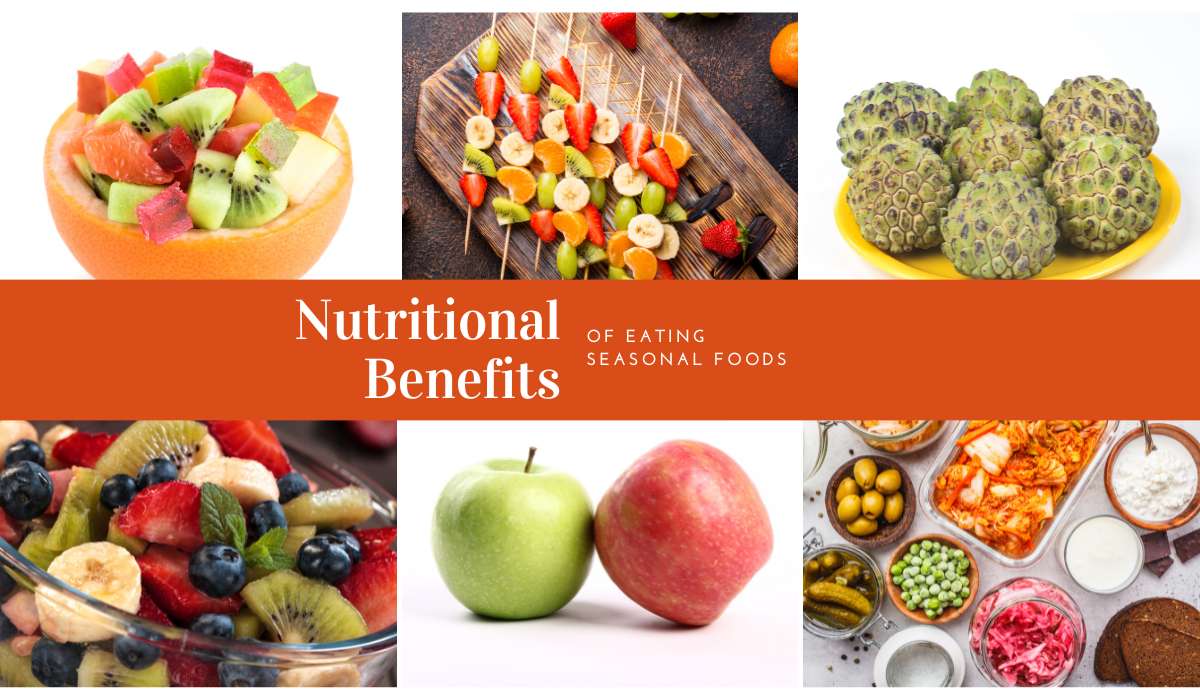Nutritional Benefits of Eating Seasonal Foods, consuming fruits and vegetables that are grown and harvested during their natural growing season. This means choosing foods that are fresh and abundant during certain times of the year. Seasonal eating allows you to enjoy the maximum flavor and nutritional benefits of the produce.
It is important to understand the concept of seasonal eating because it encourages a connection with nature and promotes sustainable agriculture practices. By consuming foods when they are in season, you support local farmers and reduce your carbon footprint by reducing the distance traveled for transportation.
Additionally, seasonal foods tend to be more affordable as the supply is higher when they are in their peak season. They are also more likely to be packed with nutrients since they are freshly harvested.
By embracing seasonal eating, you can experience a wider variety of flavors throughout the year, plus benefit from the nutritional value that these fresh foods provide. So get ready to explore the delicious world of seasonal eating!
Benefits of Choosing Seasonal Foods

Choosing seasonal foods offers a range of benefits for your health and well-being. Firstly, you can enjoy produce that is at its peak ripeness and flavor. It tastes better because it is harvested when it is fully mature, allowing the natural sugars and flavors to develop.
Seasonal foods also tend to be more nutritious compared to their out-of-season counterparts. They are picked at the right moment, ensuring that they retain their maximum nutrient content. This means you are getting the most vitamins, minerals, and antioxidants from your food.
By eating seasonally, you support local farmers and sustainable agriculture practices. You contribute to the local economy and reduce transportation emissions since the produce doesn’t need to travel long distances to reach your plate.
Another advantage is cost-effectiveness. Seasonal foods are more abundant during their peak season, which leads to lower prices. This makes it easier to incorporate a wide variety of fruits and vegetables into your diet without breaking the bank.
Overall, choosing seasonal foods allows you to enjoy tastier, more nutritious, and affordable options while supporting local farmers and reducing your environmental impact.
Spring Seasonal Foods
Spring is a wonderful time to explore the abundance of fresh seasonal foods available. During this season, you can enjoy a variety of delicious and nutritious options. One popular spring vegetable is asparagus, which is packed with vitamins A, C, and K, as well as fiber. Another spring favorite is peas, which provide a good source of protein and are rich in minerals like iron and potassium.
Leafy greens such as spinach and lettuce are also in their prime during the spring months. These greens offer a wide range of nutrients including folate, vitamin C, and beta-carotene. They make a great addition to salads and can be used in various recipes.
In addition to vegetables, spring is also the season for fruits like strawberries and rhubarb. Strawberries are not only delicious but also high in antioxidants. Rhubarb adds a unique tart flavor to dishes and is a good source of fiber and vitamin K.
Taking advantage of these spring seasonal foods allows you to benefit from their fresh flavor and nutritional content. Incorporating them into your meals will help support your overall health and well-being.
Summer Seasonal Foods

During the summer months, you have access to a wide variety of delicious and nutritious seasonal foods. One popular summer fruit is watermelon, which is not only hydrating but also packed with vitamins A and C. Enjoy it as a refreshing snack or use it in salads for a burst of flavor.
Another summer favorite is corn, which is sweet and juicy during this season. It is a good source of fiber, vitamin C, and folate. Grill or steam it for a tasty side dish or add it to salsas and salads for extra crunch.
Berries such as strawberries, blueberries, and raspberries are also in abundance during the summer. These colorful fruits are rich in antioxidants and provide essential nutrients like vitamin C. Enjoy them fresh on their own, or add them to smoothies, yogurt, or salads for a nutritious boost.
Tomatoes are another highlight of the summer season. They are juicy and flavorful, and contain lycopene, a powerful antioxidant that may have numerous health benefits. Use them in fresh salads, sandwiches, or make homemade salsa or gazpacho.
Don’t forget about zucchini and yellow squash! These versatile vegetables are low in calories and high in vitamins A and C. Grill or sauté them as a side dish or add them to stir-fries and pasta dishes for extra nutrition.
By incorporating these summer seasonal foods into your diet, you can enjoy their fresh flavors while reaping their nutritional benefits. So go ahead and make the most of the summertime bounty!
Hydration and Nutrients from Summer Fruits
Summer fruits not only offer delicious flavors, but they also provide much-needed hydration during the hot months.
Watermelon is a great example of a hydrating fruit. With its juicy flesh, it helps keep you hydrated while enjoying its natural sweetness. Plus, watermelon is an excellent source of vitamins A and C, which support immune function and promote healthy skin.
Another hydration hero is the humble strawberry. These juicy berries are packed with water content and are a good source of vitamin C, which aids in collagen production and strengthens your immune system.
Blueberries are another summer favorite that offers hydration along with a myriad of health benefits. These tiny berries are loaded with antioxidants and fiber, helping to satisfy your sweet tooth while keeping you hydrated and supporting digestive health.
Raspberries are not only refreshing but also high in water content, making them an excellent choice for staying hydrated. They are rich in vitamin C and antioxidants that contribute to overall health.
By incorporating these summer fruits into your diet, you not only quench your thirst but also enjoy a replenishing dose of essential nutrients. So indulge in these hydrating treats and reap the benefits they offer during the summer season.
Fall Seasonal Foods

Fall Seasonal Foods
During the fall season, you have a wide variety of delicious and nutritious foods to choose from. One of the stars of this season is pumpkin. It’s not only great for carving into jack-o’-lanterns but also for incorporating into your meals. Pumpkin is rich in vitamins A and C, which support eye health and strengthen your immune system.
Another fall favorite is apples. Whether you enjoy them raw or cooked, apples are a versatile fruit that offers many health benefits. They are a good source of fiber, which aids in digestion and helps you feel fuller for longer.
Root vegetables like carrots, sweet potatoes, and beets are also abundant in the fall. These veggies are packed with vitamins, minerals, and antioxidants that promote overall health. They can be roasted, steamed, or added to soups and stews for a comforting and nutritious meal.
Lastly, don’t forget about cranberries! These tart berries are in season during the fall and are known for their high antioxidant content. They are not only delicious but also provide numerous health benefits, including supporting urinary tract health.
Fall is the perfect time to incorporate these seasonal foods into your diet for maximum flavor and nutritional benefits.
Winter Seasonal Foods
During the winter season, you have a wide variety of nutritious and delicious foods to choose from. One of the stars of this season is citrus fruits. Oranges, grapefruits, and clementines are packed with vitamin C, which can help boost your immune system and keep you healthy during the cold winter months.
Another winter favorite is root vegetables like potatoes, carrots, and parsnips. These veggies are rich in fiber and provide essential vitamins and minerals. They can be roasted, mashed or added to soups and stews to provide warmth and nourishment.
Winter is also the time for hearty leafy greens like kale, spinach, and Brussels sprouts. These greens are packed with nutrients such as vitamin K, vitamin A, and folate. They can be enjoyed steamed or sautéed to add a healthy dose of vitamins to your meals.
Don’t forget about winter squashes like butternut squash and acorn squash. These veggies are not only delicious but also high in fiber and vitamins A and C. They can be roasted or used in soups for a comforting winter meal.
Incorporating these seasonal foods into your diet during the winter months can provide you with a range of nutrients to keep you healthy and warm.
Conclusion of Nutritional Benefits of Eating Seasonal Foods
Incorporating seasonal foods into your diet is not only a smart choice but also a delicious one. By choosing to eat fruits and vegetables that are in season, you can reap numerous nutritional benefits.
Eating seasonal foods ensures that you are getting produce at its peak freshness and flavor. The fruits and vegetables harvested during their proper season tend to be more nutrient-dense as they have had time to fully ripen and develop their natural flavors.
Seasonal eating also supports local farmers and reduces the carbon footprint associated with long-distance transportation of out-of-season produce. It allows you to connect with your local community and appreciate the bounty of nature.
By choosing seasonal foods, you can enjoy a diverse range of flavors, textures, and nutrients throughout the year. So next time you plan your meals or visit the grocery store, try to opt for the seasonal options available.
Remember, eating seasonal is not only good for your health but also for the environment. So let’s embrace the beauty of each season and nourish ourselves with the goodness nature provides.
Tips for Incorporating Seasonal Foods into Your Diet:
- Visit your local farmer’s market or join a community-supported agriculture (CSA) program.
- Research what fruits and vegetables are in season each month.
- Experiment with new recipes featuring seasonal ingredients.
- Preserve or freeze excess seasonal produce for later use.
- Get creative and try different cooking methods like grilling, roasting, or sautéing.
- Incorporate seasonal fruits into smoothies or salads for a refreshing and healthy treat.
- Be mindful of where your food comes from and choose locally sourced options whenever possible.
Enjoy the benefits of eating seasonal foods while supporting local farmers and enjoying a varied and nutritious diet throughout the year!
For More Blogs visit Aerns

